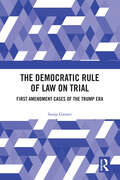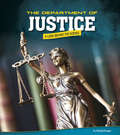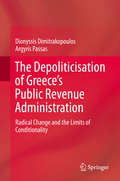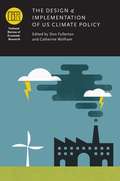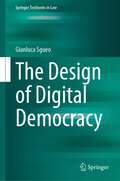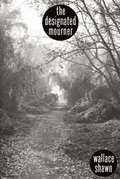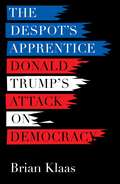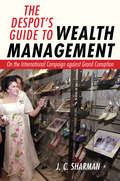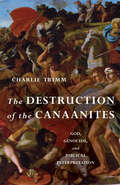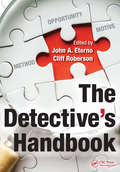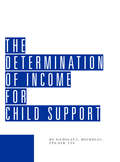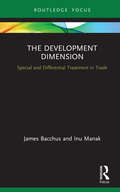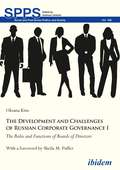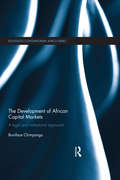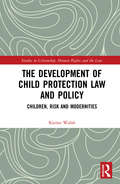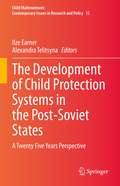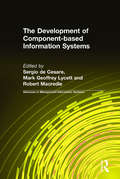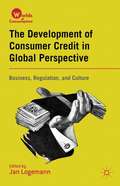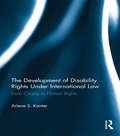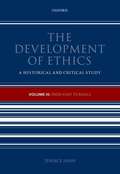- Table View
- List View
The Democratic Rule of Law on Trial: First Amendment Cases of the Trump Era
by Sonja GroverThis book examines selected high-profile U.S. First Amendment cases occurring during the Trump era as a vehicle for exploring a possible fundamental commonality in understanding the democratic rule of law globally. In each of these cases, the adjudicating body’s analytical legal strategy is discussed in terms of how it reinforces or detracts from the democratic rule of law. It was and continues to be highly internationally anticipated as to what legal examples are being set by this established democracy when confronted by legal contests between the former Trump administration and those alleging their rights were somehow violated by the executive of that time. Thus, the book is instructive for an international audience on the essential role of the courts in protecting democracy through providing, where supported by the law and the facts, a remedy for the aggrieved comparatively powerless. The book will be essential reading for academics and researchers working in the areas of constitutional law, politics and human rights.
The Department of Justice: A Look Behind the Scenes (U.S. Government Behind the Scenes)
by Michael BurganDescribes the history of the Department of Justice, and how it has evolved, what the pressing issues are today, and what lies ahead in the near future. Takes a potentially dry topic and makes it accessible for the younger reader. Sidebars highlight important issues and figures in history.
The Depoliticisation of Greece’s Public Revenue Administration: Radical Change and the Limits of Conditionality
by Dionyssis Dimitrakopoulos Argyris PassasThis book analyses the reform of Greece’s public revenue administration promoted by its international lenders under the successive bailout agreements put in place since 2010. In particular, it shows how an integral part of the finance ministry was converted into an independent agency operating largely outside the direct control of the finance minister. The authors focus on the implementation of this major reform and demonstrate the impact of domestic decisions on the increasing specificity of the international lenders’ demands and the concomitant lack of confidence in the Greek political élite’s commitment to the reform package. This book helps readers understand the response to the eurozone crisis (especially, the conditionality of funding), Greece’s reform capacity with a focus on its tax administration, and the expansion of the scope of non-majoritarian institutions in Western democracies.
The Derivative Action in Asia: A Comparative and Functional Approach
by Michael Ewing-Chow Dan W. Puchniak Harald BaumThis in-depth comparative examination of the derivative action in Asia provides a framework for analysing its function, history and practical application and examines in detail how derivative actions law works in practice in seven important Asian jurisdictions (China, Hong Kong, India, Japan, Korea, Taiwan and Singapore). These case studies allow an evaluation of a number of the leading Western comparative corporate law and governance theories which have come to define the field over the last decade. By debunking some of these critically important theories, this book lays the foundation for an accurate understanding of the derivative action in Asia and a re-examination of the regulation of the derivative action around the world.
The Derrick Bell Reader
by Richard Delgado Jean StefancicLawyer, activist, teacher, writer: for over 40 years, Derrick Bell has provoked his critics and challenged his readers with uncompromising candor and progressive views on race and class in America. A founder of Critical Race Theory and pioneer of the use of allegorical stories as tools of analysis, Bell's groundbreaking work shatters conventional legal orthodoxies and turns comfortable majoritarian myths inside out. Edited and with an extensive introduction by leading critical race theorists Richard Delgado and Jean Stefancic, The Derrick Bell Reader reflects the tremendous breadth of issues that Bell has grappled with over his phenomenal career, including affirmative action, black nationalism, legal education and ethics. Together, the selections offer the most complete collection of Derrick Bell's writing available today.
The Design and Implementation of US Climate Policy
by Don Fullerton Catherine WolframEconomic research on climate change has been crucial in advancing our understanding of the consequences associated with global warming as well as the costs and benefits of the various policies that might reduce emissions of greenhouse gases. As nations work to develop climate policies, economic insights into their design and implementation are ever more important. With a balance between theoretical and empirical approaches, The Design and Implementation of US Climate Policy looks at the possible effects of various climate policies on a range of economic outcomes. The studies that comprise the volume examine topics that include the coordination--or lack thereof--between the federal and state governments, implications of monitoring and enforcing climate policy, and the specific consequences of various climate policies for the agricultural, automotive, and buildings sectors.
The Design of Digital Democracy (Springer Textbooks in Law)
by Gianluca SgueoEver-stronger ties between technology, entertainment and design are transforming our relationship with democratic decision-making. When we are online, or when we use digital products and services, we tend to focus more on certain factors like speed of service and user-friendliness, and to overlook the costs – both for ourselves and others. As a result, a widening gap separates our expectations of everything related to digitalization – including government – and the actual practice of democratic governance. Democratic regulators, unable to meet citizens’ demands for tangible, fast and gratifying returns, are seeing the poorest results ever recorded in terms of interest, engagement and retention, despite using the most cutting-edge technologies. This book explores various aspects of the relationship between democracy, technology and entertainment. These include, on the one hand, the role that digital technology has in strengthening our collective intelligence, nurturing empathic relations between citizens and democratic institutions, and supporting processes of political aggregation, deliberation and collaboration. On the other hand, they comprise the challenges accompanying digital technology for representation, transparency and inclusivity in democratic decision-making. The book’s main argument is that digital democratic spaces should be redesigned to narrow the gap between the expectations and outcomes of democratic decision-making. It suggests abandoning the notion of digital participatory rights as being fast and easy to enjoy. It also refutes the notion that digital democratic decision-making can only be effective when it delivers rapid and successful responses to the issues of the day, regardless of their complexity. Ultimately, the success or failure of digital democracy will depend on the ability of public regulators to design digital public spaces with a commitment to complexity, so as to make them appealing, but also effective at engaging citizens.
The Designated Mourner
by Wallace Shawn"The play nicely combines Pinterian menace with caustic political commentary." -Time"Acerbic, elusive, poetic and chilling, the writing is demanding in a rarefied manner. Its implications are both affecting and disturbing." -Los Angeles Times"In his exquisitely written dramatic lament for the decline of high culture. . . . [Shawn] offers a definition of the self that should rattle the defenses of intellectual snobs everywhere." -The New York TimesWriter and performer Wallace Shawn's landmark 1996 play features three characters--a respected poet, his daughter, and her English-professor husband--suspected of subversion in a world where culture has come under the control of the ruling oligarchy. Told through three interwoven monologues, the Orwellian political story is recounted alongside the visceral dissolution of a marriage. The play debuted at the Royal National Theatre in London, in a production directed by David Hare, who also directed the film version, starring Mike Nichols and Miranda Richardson. The play's subsequent New York premiere was staged in a long-abandoned men's club in lower Manhattan, directed by Shawn's longtime collaborator André Gregory.Wallace Shawn is the author of Our Late Night (OBIE Award for Best Play), Marie and Bruce, Aunt Dan and Lemon, The Fever, and the screenplay for My Dinner with André. His most recent play, Grasses of a Thousand Colors, premiered last year in London.
The Designation of Marine Protected Areas: A Legal Obligation
by Anna von RebayThis book provides empirical evidence that all States have a universally binding obligation to adopt national laws and international treaties to protect the marine environment, including the designation of Marine Protected Areas. Chapter by chapter this obligation is detailed, providing the foundation for holding States responsible for fulfilling this obligation. The fundamentals are analysed in a preliminary chapter, which examines the legally binding sources of the Law of the Sea as well as its historical development to help readers understand the key principles at hand.The Law of the Sea provides more than 1000 instruments and more than 300 regulations concerning marine protection. While the scope of most treaties is limited either regarding species, regions or activities, one regulation addresses States in all waters: the obligation to protect and preserve the marine environment as stipulated under Art. 192 of the 1982 United Nations Convention on the Law of the Sea (UNCLOS). As this ‘Constitution of the Ocean’ not only contains conventional laws but also very broadly reflects pre-existing rules of customary international law, an extensive analysis of all statements made by States in the UN General Assembly, their practices, national laws and regulations as well as other public testimonials demonstrates that Art. 192 UNCLOS indeed binds the whole community of States as a rule of customary international law with an erga omnes effect. Due to the lack of any objections and its fundamental value for humankind, this regulation can also be considered a new peremptory norm of international law (ius cogens).While the sovereign equality of States recognises States’ freedom to decide if and how to enter into a given obligation, States can also waive this freedom. If States accepted a legally binding obligation, they are thus bound to it. Concerning the specific content of Art. 192 UNCLOS, a methodical interpretation concludes that only the adoption of legislative measures (national laws and international agreements) suffices to comply with the obligation to protect and preserve the marine environment, which is confirmed by the States’ practices and relevant jurisprudence. When applied to a specific geographical area, legislative measures to protect the marine environment concur with the definition of Marine Protected Areas. Nonetheless, as the obligation applies to all waters, the Grotian principle of the freedom of the sea dictates that the restriction of activities through the designation of Marine Protected Areas, on the one hand, must be weighed against the freedoms of other States on the other. To anticipate the result: while all other rights under the UNCLOS are subject to and contingent on other regulations of the UNCLOS and international law, only the obligation to protect and preserve the marine environment is granted absolutely – and thus outweighs all other interests.
The Despot's Apprentice: Donald Trump's Attack on Democracy
by David Talbot Brian Klaas”[A] primer on the threat to democracy posed by—and I can’t believe I’m saying this—the current president of the United States.”—David Litt, New York Times bestselling authorDonald Trump isn’t a despot. But he is increasingly acting like The Despot’s Apprentice, an understudy in authoritarian tactics that threaten to erode American democracy, including:Attacking the pressThreatening rule of law by firing those who investigate his alleged wrongdoingsUsing nepotism to staff the White Houseand countless other techniquesDonald Trump is borrowing tactics from the world’s dictators and despots. Trump’s fascination with the military, his obsession with his own cult of personality, and his deliberate campaign to blur the line between fact and falsehood are nothing new to the world of despots. But they are new to the United States. With each authoritarian tactic or tweet, Trump poses a unique threat to democratic government in the world’s most powerful democracy.At the same time, Trump’s apprenticeship has serious consequences beyond the United States. His bizarre adoration and idolization of despotic strongmen—from Russia’s Putin, to Turkey’s Erdogan, or to the Philippines’ Duterte—has transformed American foreign policy into a powerful cheerleader for some of the world’s worst regimes.In The Despot’s Apprentice, an ex-US campaign advisor who has sat with the world’s dictators explains Donald Trump’s increasingly authoritarian tactics and how Trump uniquely threatens American democracy... and how to save it from him.
The Despot's Guide to Wealth Management: On the International Campaign against Grand Corruption
by J. C. SharmanAn unprecedented new international moral and legal rule forbids one state from hosting money stolen by the leaders of another state. The aim is to counter grand corruption or kleptocracy ("rule by thieves"), when leaders of poorer countries—such as Marcos in the Philippines, Mobutu in the Congo, and more recently those overthrown in revolutions in the Arab world and Ukraine—loot billions of dollars at the expense of their own citizens. This money tends to end up hosted in rich countries. These host states now have a duty to block, trace, freeze, and seize these illicit funds and hand them back to the countries from which they were stolen. In The Despot's Guide to Wealth Management, J. C. Sharman asks how this anti-kleptocracy regime came about, how well it is working, and how it could work better. Although there have been some real achievements, the international campaign against grand corruption has run into major obstacles. The vested interests of banks, lawyers, and even law enforcement often favor turning a blind eye to foreign corruption proceeds. Recovering and returning looted assets is a long, complicated, and expensive process.Sharman used a private investigator, participated in and observed anti-corruption policy, and conducted more than a hundred interviews with key players. He also draws on various journalistic exposés, whistle-blower accounts, and government investigations to inform his comparison of the anti-kleptocracy records of the United States, Britain, Switzerland, and Australia. Sharman calls for better policing, preventative measures, and use of gatekeepers like bankers, lawyers, and real estate agents. He also recommends giving nongovernmental organizations and for-profit firms more scope to independently investigate corruption and seize stolen assets.
The Destruction of Palestine Is the Destruction of the Earth
by Andreas MalmMalm unearths the shared roots of colonial adventurism in Palestine and fossil fuelled warfare.Israel&’s pulverization of Gaza since October 7, 2023 is not only a humanitarian crisis, but an environmental catastrophe. Far from the first event of its kind, the devastation Israel has inflicted on Palestine since October 2023 has merely ushered in a new phase in a long history of colonization and extraction that reaches back to the nineteenth century. In this urgent pamphlet, Andreas Malm argues that a true understanding of the present crisis requires a longue durée analysis of Palestine's subjugation to fossil empire. Returning to the British empire&’s first use of steam-power in war, in which it destroyed the Palestinian city of Akka, Malm traces the development of Britain&’s fossil empire and shows how this enduring commitment to fossil energy continues to drive Western support for the destruction of Palestine today.
The Destruction of the Canaanites: God, Genocide, and Biblical Interpretation
by Charlie TrimmHow can a good God command genocide? In this short, accessible offering, Charlie Trimm provides the resources needed to make sense of one of the Bible&’s most difficult ethical problems—the Israelite destruction of the Canaanites as told in the books of Deuteronomy, Joshua, and Judges. Trimm begins with a survey of important background issues, including the nature of warfare in the ancient Near East, the concept of genocide (with perspectives gleaned from the field of genocide studies), and the history and identity of the Canaanite people. With this foundation in place, he then introduces four possible approaches to reconciling biblical violence:Reevaluating God—concluding that God is not good.Reevaluating the Old Testament—concluding that the Old Testament is not actually a faithful record of God&’s actions.Reevaluating the interpretation of the Old Testament—concluding that the Old Testament does not in fact describe anything like genocide.Reevaluating the nature of violence in the Old Testament—concluding that the mass killing of the Canaanites in the Old Testament was permitted on that one occasion in history.The depth of material provided in concise form makes Trimm&’s book ideal as a supplementary textbook or as a primer for any Christian perturbed by the stories of the destruction of the Canaanites in the Old Testament.
The Detective's Handbook
by Cliff Roberson John A. EternoThe Detective‘s Handbook details the vital information law enforcement officers need to know to become better detectives. Since all essential aspects of detective work cannot be covered in a single volume, the editors have selected 20 of the most critical issues detectives face in their day-to-day work and present them in separate chapters.Using a
The Determination of Income for Child Support
by Nick BourdeauAccurate income figures are essential to child support calculations, but obtaining and agreeing upon true income can be a challenging process. Here is help. Nicholas Bourdeau's The Determination of Income for Child Support walks you line-by-line and issue-by-issue through the areas where income adjustments are most likely to be found. In this groundbreaking work, you receive: * Hard-won advice obtained from over 1,000 investigations. * Line-by-line guidance to Form 1040 and its supporting forms, annotated with common areas of dispute and what to investigate. * Detailed directions for questioning the deductions of self-employed individuals. * Tips for determining income when records are lacking. * Dozens of detailed illustrations highlighting common adjustments.
The Development Dimension: Special and Differential Treatment in Trade (Insights on International Economic Law)
by James Bacchus Inu ManakThis book critically analyses the World Trade Organization’s approach to "special and differential treatment" (SDT) to argue that it is founded on seeking exemptions from WTO obligations, instead of creating an enabling environment for developing countries to integrate fully into the multilateral trading system. Through six key sections: United States Proposal on Special and Differential Treatment Responses to United States Proposal The Evolution of Differential Treatment Failure of the Current Approach to Differential Treatment Complications Created by China’s Emergence in the Global Economy An Alternative Approach to Differential Treatment this book explores how, by adopting a new evidence-based, case-by-case approach to SDT, the development of the poorest countries can best be advanced, while at the same time ensuring that advanced developing countries carry their weight in the organization. It will be of interest to scholars and students of international trade law and political science, as well as trade practitioners such as lawyers, diplomats, and analysts.
The Development and Challenges of Russian Corporate Governance I: The Roles and Functions of Boards of Directors (Soviet and Post-Soviet Politics and Society #198)
by Oksana KimDespite increasing attention toward Russia’s economy and capital market, corporate governance norms of Russian public firms are rarely analyzed. This project presents and interprets evidence regarding various governance practices followed by Russian firms covering almost the entire period of the existence of the Russian stock market. Its findings run counter to some widely held beliefs according to which Russia is a country with high resistance to corporate innovations due to socialist legacies.Part one of this two-volume study focuses on the role that boards of directors play in reducing intra-corporate agency conflicts. Russian companies have adopted progressive governance mechanisms including director independence, nationality and gender diversity on the board, dismissal of poorly performing CEOs, and cross-listing of companies on foreign markets with stringent reporting obligations. Some of these innovations have had notably positive impact on firms’ performances and market valuation. Others, such as nationality diversity on boards of directors, enhanced the image of Russian companies but made little contribution toward improving internal governance. Unresolved issues impeding further progress include limited liability of directors before shareholders due to imperfections of the Russian legal system, a taboo on disclosures of executives’ compensations, and generally high risks of conducting business in Russia. Despite impressive improvements in internal practices, Russian firms still have a long way to go to achieve the governance levels of their peers in developed countries.
The Development of African Capital Markets: A Legal and Institutional Approach (Routledge Contemporary Africa)
by Boniface ChimpangoMost capital markets that have been established in developing economies like Africa have struggled to make progress over two decades down the line. Development of African Capital Markets explores why these markets have remained underdeveloped and discusses a possible development theory that can be used in designing and implementing legal and institutional reforms to reinvigorate capital markets in African and other developing countries. Boniface Chimpango analyses the weaknesses of capital markets in developing countries, and argues that legal and institutional framework for capital markets in developing countries should be tailored to the unique informal rules prevalent in each country rather than being transplanted from developed countries. This book will be of interest to scholars, students and policy makers in the fields of economic development, African Studies, law, development and regulatory policy.
The Development of Bioethics in the United States
by Jeremy R. Garrett D. Christopher Ralston Fabrice JotterandIn only four decades, bioethics has transformed from a fledgling field into a complex, rapidly expanding, multidisciplinary field of inquiry and practice. Its influence can be found not only in our intellectual and biomedical institutions, but also in almost every facet of our social, cultural, and political life. This volume maps the remarkable development of bioethics in American culture, uncovering the important historical factors that brought it into existence, analyzing its cultural, philosophical, and professional dimensions, and surveying its potential future trajectories. Bringing together a collection of original essays by seminal figures in the fields of medical ethics and bioethics, it addresses such questions as the following: - Are there precise moments, events, socio-political conditions, legal cases, and/or works of scholarship to which we can trace the emergence of bioethics as a field of inquiry in the United States? - What is the relationship between the historico-causal factors that gave birth to bioethics and the factors that sustain and encourage its continued development today? - Is it possible and/or useful to view the history of bioethics in discrete periods with well-defined boundaries? - If so, are there discernible forces that reveal why transitions occurred when they did? What are the key concepts that ultimately frame the field and how have they evolved and developed over time? - Is the field of bioethics in a period of transformation into biopolitics? Contributors include George Annas, Howard Brody, Eric J. Cassell, H. Tristram Engelhardt Jr., Edmund L. Erde, John Collins Harvey, Albert R. Jonsen, Loretta M. Kopelman, Laurence B. McCullough, Edmund D. Pellegrino, Warren T. Reich, Carson Strong, Robert M. Veatch, and Richard M. Zaner.
The Development of Child Protection Law and Policy: Children, Risk and Modernities (Studies in Citizenship, Human Rights and the Law)
by Kieran WalshThis book examines how child protection law has been shaped by the transition to late modernity and how it copes with the ever-changing concept of risk. The book traces the evolution of the contemporary child protection system through historical changes, assessing the factors that have influenced the development of legal responses to abuse over a 130-year period. It does so by focussing on the Republic of Ireland where child protection has become emblematic of wider social change. The work draws on a wide range of primary and secondary sources including legislation, case law and official and media reports of child protection inquiries. It also utilises insights developed through an extensive examination of parliamentary debates on child protection matters. These materials are assessed through the lens of critical discourse analysis to explore the relationship between law, social policy and social theory as they effect child protection. While the book utilises primarily Irish sources, this multidisciplinary approach ensures the argument has international applicability. The book will be a valuable resource for all those with an interest in the development of child protection law.
The Development of Child Protection Systems in the Post-Soviet States: A Twenty Five Years Perspective (Child Maltreatment #12)
by Ilze Earner Alexandra TelitsynaThis volume provides an understanding of how systems of child protection evolve in disparate cultural, social and economic contexts. Using the former Soviet Union as a starting point, it examines how 13 countries have developed, defined and evolved their system of protecting children and providing services to families over the last 25 years since independence. The volume runs an uniform approach in each country and then traces the development of unique systems, contributing to the international understanding of child protection and welfare. This volume is a fascinating study for social scientists, social workers, policy makers with particular interest to those focusing on children, youth, and family issues alike as each chapter offers a clear and compelling view of the central changes, competing claims and guiding assumptions that have formed each countries individual approach to child protection and family services.
The Development of Component-based Information Systems (Advances In Management Information Systems Ser.)
by Sergio de Cesare Mark Geoffrey Lycett Robert MacredieThis work provides a comprehensive overview of research and practical issues relating to component-based development information systems (CBIS). Spanning the organizational, developmental, and technical aspects of the subject, the original research included here provides fresh insights into successful CBIS technology and application. Part I covers component-based development methodologies and system architectures. Part II analyzes different aspects of managing component-based development. Part III investigates component-based development versus commercial off-the-shelf products (COTS), including the selection and trading of COTS products.
The Development of Consumer Credit in Global Perspective
by Jan LogemannThis volume brings together historians, economists, political scientists, and anthropologists to present a global perspective on the new forms of lending and borrowing that have become a key feature of twentieth-century mass consumer societies, emphasizing comparative and transnational historical perspectives.
The Development of Disability Rights Under International Law: From Charity to Human Rights
by Arlene S. KanterThe adoption of the Convention on the Rights of People with Disabilities (CPRD) by the United Nations in 2006 is the first comprehensive and binding treaty on the rights of people with disabilities. It establishes the right of people with disabilities to equality, dignity, autonomy, full participation, as well as the right to live in the community, and the right to supported decision-making and inclusive education. Prior to the CRPD, international law had provided only limited protections to people with disabilities. This book analyses the development of disability rights as an international human rights movement. Focusing on the United States and countries in Asia, Africa, the Middle East the book examines the status of people with disabilities under international law prior to the adoption of the CPRD, and follows the development of human rights protections through the convention’s drafting process. Arlene Kanter argues that by including both new applications and entirely new approaches to human rights treaty enforcement, the CRPD is significant not only to people with disabilities but also to the general development of international human rights, by offering new human rights protections for all people. Taking a comparative perspective, the book explores how the success of the CRPD in achieving protections depends on the extent to which individual countries enforce domestic laws and policies, and the changing public attitudes towards people with disabilities. This book will be of excellent use and interest to researchers and students of human rights law, discrimination, and disability studies.
The Development of Ethics A Historical and Critical Study Volume III: From Kant to Rawls
by Terence IrwinThis book is a selective historical and critical study of moral philosophy in the Socratic tradition, with special attention to Aristotelian naturalism. It discusses the main topics of moral philosophy as they have developed historically, including: the human good, human nature, justice, friendship, and morality; the methods of moral inquiry; the virtues and their connexions; will, freedom, and responsibility; reason and emotion; relativism, subjectivism, andrealism; the theological aspect of morality. The first volume discusses ancient and mediaeval moral philosophy.
